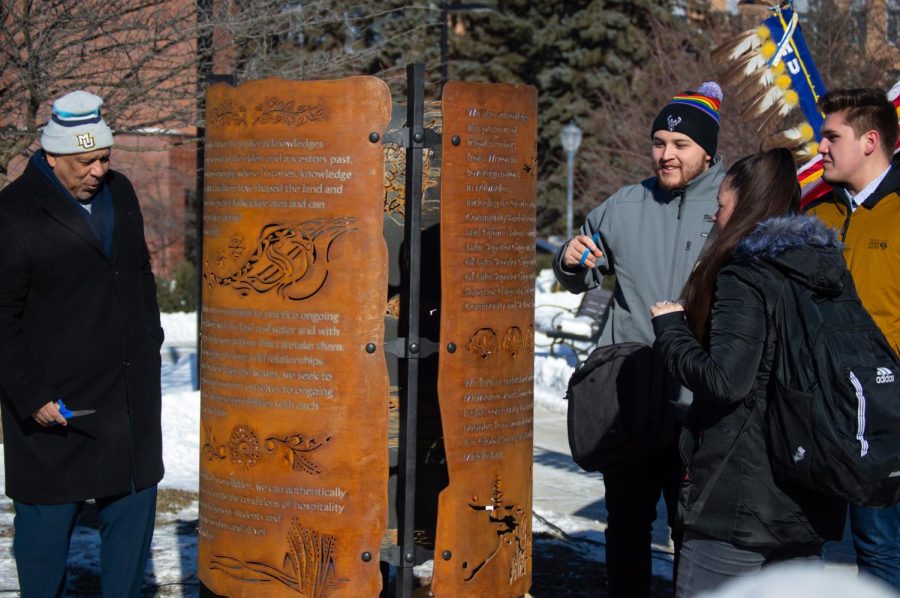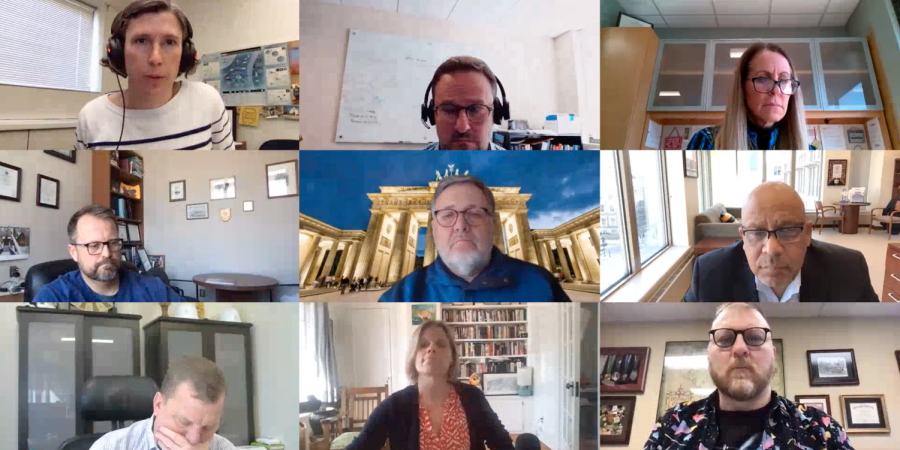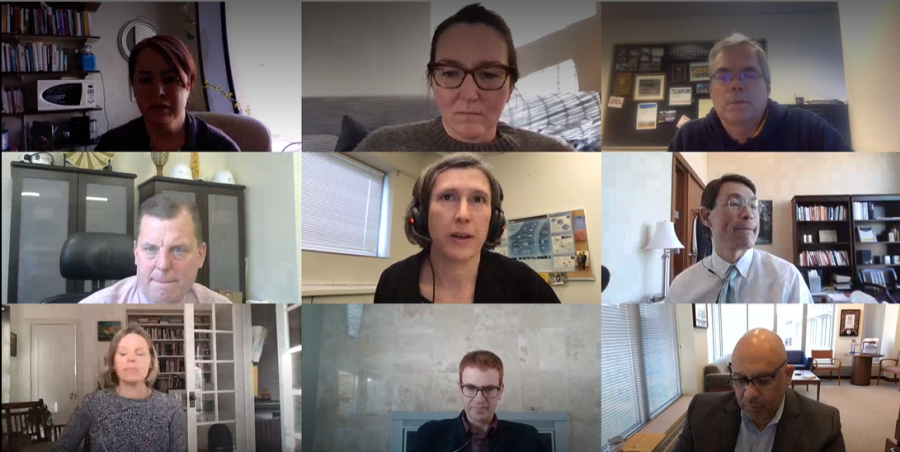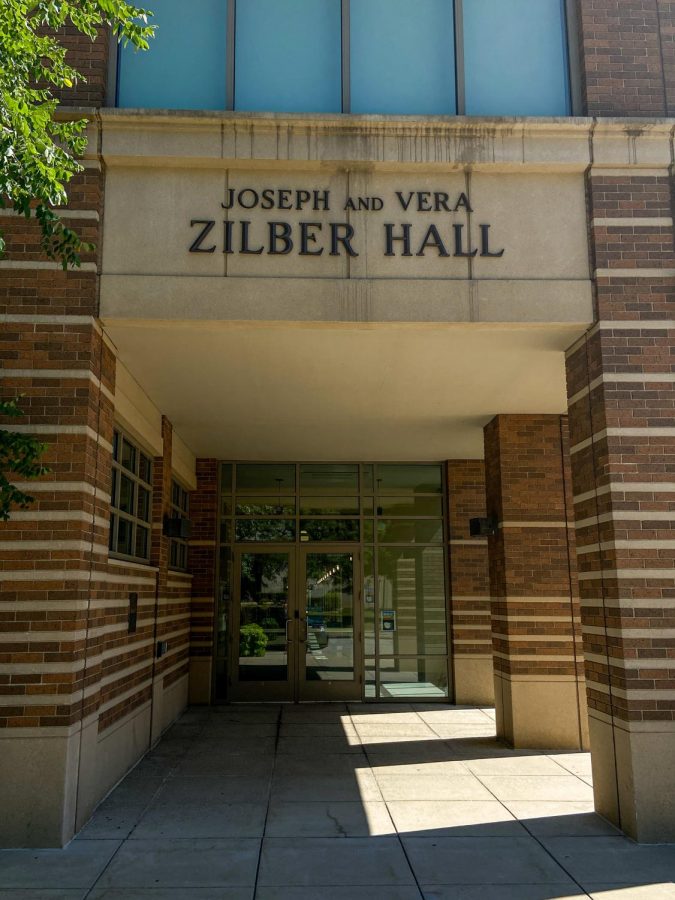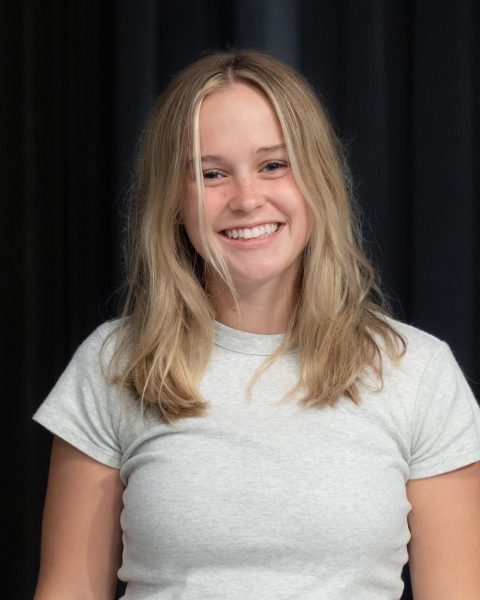Students, faculty, alumni and Native American veterans gathered outside the Alumni Memorial Union to witness the unveiling of the Land and Water Acknowledgment marker Friday, Feb. 3.
The oral and written version of the Land and Water Acknowledgment was adopted back in 2021 in partnership between Marquette’s council on Native American affairs and faculty advisors.
The marker is located in the Eckstein Commons in the center of campus. The marker is a group of metal plates wrapped around a birch tree that’s native to Wisconsin. Artist Kristelle M. Ulrich engraved the metal with images of nature and animals important to the tribes of Wisconsin.
“If this is the first experience students have with indigenous people and their history and heritage then that’s what we hope to accomplish,” Alexander Liberato, a graduate of Marquette class of 2021 and former president of the Native American Student Association, said.
Provost Kimo Ah Yun said they talked about a lot of different options for the marker and collaborated with an artist to create a marker that would signify the vision students had.
“It’s an acknowledgment that Native American people lived here for hundreds of years, so it’s an understanding and a reminder that we’re on lands that have existed, that the indigenous people lived on it and cultivated,” Ah Yun said.
Christine Navia, vice president for inclusive excellence said she hopes the marker will be a source of curiosity for students. Since it’s located right outside the AMU, she said she hopes that students will walk past the marker and want to learn more about its origin and who it represents.
“For me, it’s a good marker of student advocacy, their attempts to change the institution to reflect who they are, but it’s also a physical invitation to learn more,” Navia said.
Navia said the marker and the new seal shows how the university has evolved in the past couple of years. She hopes people see these changes and understand that Marquette is a place where people can be themselves, and where students respect one another.
The Native American Student Association has been pushing Marquette to create a community on campus that supports Native American students.
Liberato said Marquette had a lot of different groups on campus step up and work together to create a movement for the Native American community. While he says progress has been made, he thinks more can still be done.
“We’ve accomplished a lot, and while these things are great, they’re ultimately symbolic in nature. It doesn’t pay for an indigenous students scholarship, it doesn’t make sure they have a place to stay and eat in,” Liberato said. “These are a lot of problems indigenous students face here at Marquette. I know students who have had to drop out because of these quality of life issues, so this is what we should be focusing on most of all.”
Marquette’s seal was changed in 2022 after decades long pushback due to it’s inaccurate depiction of Father Marquette leading Indigenous people.
Marquette has replaced the seals on the diplomas for the class of 2022, and switched out seals around campus. They’re still working on replacing seals on plaques, portals and the rotunda seal in the AMU.
Liberato said that Marquette should offer more scholarships for Indigenous students. Marquette has one scholarship, but it only goes to one student and it isn’t a full scholarship.
Liberato said having more scholarships could keep indigenous students out of loan debt and keep them away from worrying about living costs, considering that these concerns are what guide the success of some students in college.
Ah Yun said last year Marquette signed a transfer agreement with Lac Courte Oreilles Ojibwe College in Hayward, Wisconsin to allow their students to transfer to Marquette as well as created a scholarship for one student from LCOOC to come to Marquette.
“We look at how do we provide access for students who want to come here,” Ah Yun said. “How do we make this a more welcoming university to have more Native American and other diverse students want to come to Marquette and be transformed to go out and make a difference in the world.”
Ah Yun said that the university is looking to continue moving forward with its plans to make Marquette’s campus more welcoming to all groups. He said he wants to continue engaging with students to see what their hopes are for the future of the university.
This story was written by Sophia Tiedge. She can be reached at [email protected].


